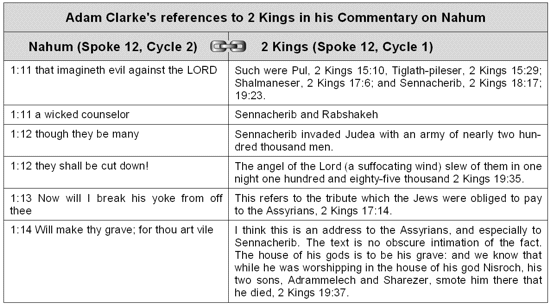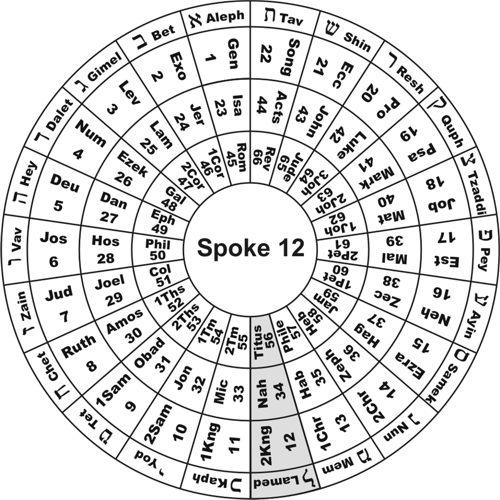The Rod of Comfort and Wrath
The burden of Nineveh. The book of the vision of Nahum the Elkoshite. God is jealous,
and the LORD revengeth; the LORD revengeth, and is furious; the LORD will take vengeance on his adversaries,
and he reserveth wrath for his enemies. The LORD is slow to anger, and great in power, and will not
at all acquit the wicked: the LORD hath his way in the whirlwind and in the storm, and the clouds are
the dust of his feet.
Nahum 1:1ff (Spoke 12, Cycle 2)
In his Etymological Dictionary of the Hebrew Language  ,
Ernst Klein noted that the root meaning of the verb lamad was probably "to prick, sting, incite, goad."
It is the root of the noun malmad (ox-goad) formed with the Mem Prefix (Spoke 13, BW book pg 265). This word
appears once in Scripture, when Shamgar "slew of the Philistines six hundred men with an
ox goad (malmad, Judges 3:31). This reveals another aspect of the Shepherd's Rod –
the protection of His sheep from their enemies who would "eat them up," as it is
written in the most famous of Psalms: "The LORD is my shepherd ... I will fear no evil,
for thou art with me, thy rod and thy staff they comfort me." ,
Ernst Klein noted that the root meaning of the verb lamad was probably "to prick, sting, incite, goad."
It is the root of the noun malmad (ox-goad) formed with the Mem Prefix (Spoke 13, BW book pg 265). This word
appears once in Scripture, when Shamgar "slew of the Philistines six hundred men with an
ox goad (malmad, Judges 3:31). This reveals another aspect of the Shepherd's Rod –
the protection of His sheep from their enemies who would "eat them up," as it is
written in the most famous of Psalms: "The LORD is my shepherd ... I will fear no evil,
for thou art with me, thy rod and thy staff they comfort me."
The Rod of our Divine Shepherd comforts us because it both leads us in the
Way of God and protects us from evil. God's passion for the people He loves knows no limit.
Those subject to the rod of His wrath encounter a force unlike anything in nature – the Wrath of
Almighty God! It is the display of this Divine Passion for His people that gives the believers
such comfort. But comfort for God's people necessarily implies a Divine discomfiture for their enemies.
Here is how Baker put it in his commentary on Nahum:
The God of vengeance is a threatening picture only to those who want to be
their own gods and rule the earth in their own ways, but to those who trust God [Nahum 1:7]
it is a comfort and an affirmation that he is truly sovereign.
Here Baker linked the content of Nahum with the meaning of its name, which is based on
the verb nacham (to comfort). Here is how Ironside put it in his commentary on Nahum:
Nahum means consolation; and consolatory indeed are the precious words of cheer which he
was inspired to deliver in this first chapter. Vengeance belongs to God. To the Thessalonian saints Paul
writes, "It is a righteous thing with God to recompense tribulation to them that trouble you." He is
ever watching over His people; and while He permits many things for there discipline, He will
never overlook an indignity done to His redeemed. "He reserveth wrath for his enemies" (vs 2).
Note this: the enemies of His people are His enemies. He makes their cause His own. Faith
rests on this, and is thus saved much worry and anxiety. Nature would be alarmed and excited, where
faith is calm and quiet. Nature sees the Assyrian armies: faith looks up to the God of battles.
The entire 19th and 20th chapters of 2 Kings may be read with profit in this connection, as
they describe the actual scenes to which the first part of Nahum's prophecy refers.
This now brings us to the absolutely astounding supernatural link between 2 Kings and Nahum.
Ironside had no idea of the geometric structure of the Wheel when he noted the obvious correlation
between 2 Kings and Nahum any more than he did when he wrote about the correlation between the three
post-exilic History Books and the three post-exilic Minor Proph-ets (BW book pg 97).
As it turns out, Ironside is but one of a great cloud of witnesses who have testified to the profound relation
between these two Books on Spoke 12. We saw the same thing with Stedman's links between 1 Samuel and Obadiah on Spoke 9
(BW book pg 228). Such scholars, writing decades or centuries before the revelation of the Wheel,
give a powerful testimony to the objective validity of the correlations amongst the Books aligned on
its Spokes.
When I began my research on Nahum, I was completely ignorant of its historical setting.
A superficial reading left me wondering if there were any correlation with the other Books on Spoke 12 at all.
I had no idea that much of its prophecy was fulfilled in the Twelfth Book. Imagine my surprise when I opened
Adam Clarke's 1826 commentary on Nahum  and
found it filled with links to 2 Kings! Further research
confirmed and greatly amplified his observations. The table below shows his notes on the beginning
of Nahum, exactly as found in his book: and
found it filled with links to 2 Kings! Further research
confirmed and greatly amplified his observations. The table below shows his notes on the beginning
of Nahum, exactly as found in his book:

The observations of Ironside (1909 AD) and Clarke (1826 AD) gave me plenty of
clues to begin a study of the relation between 2 Kings and Nahum. Once again, I quickly found
my self standing in awe before the detailed perfection blazing from God's prophetic Word.
Next article: Assyria, the Rod of God's Anger
| 


